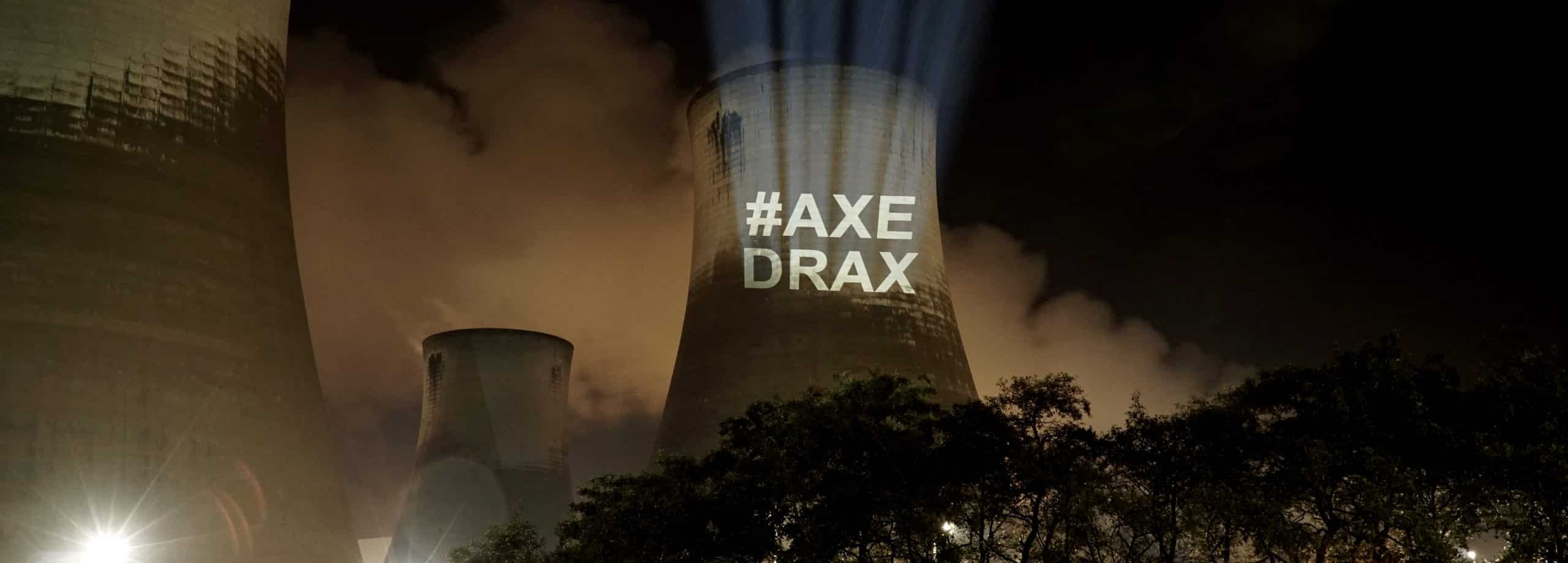21st April 2021, 11am
For immediate release
Forest and climate justice activists around the world are taking part in an online and physically distanced protest today to coincide with Drax Plc’s Annual General Meeting. Drax operates the world’s largest biomass power station in Yorkshire, fuelled by around 7 million tonnes of wood pellets every year. This wood – more than the UK can produce annually – is imported from countries including the US, Canada and Baltic States – more wood than the UK can produce.[1]
Activists from the US, UK and around the world are posting images on social media of themselves holding placards with slogans including #AxeDrax, #CutCarbonNotForests and #ForestsAreNotFuel. In Liverpool, local activists will hold a small banner protest at the port entrance adjacent to the railway line where trains carrying many of the pellets from clear-felled forests in the US destined for Drax pass.
Separately, activists from Extinction Rebellion last night projected messages onto Drax’s cooling towers including “Don’t be fooled – burning trees ain’t green”, “love wildlife, Axe Drax” and “Drax Power’s biofuel scam”. Another group from Extinction Rebellion Northampton has blockaded the road to Drax subsidiary Opus Energy’s HQ this morning.[2]
Over 20 organisations from 4 of Drax’s major wood pellet-supplying countries (The USA, Canada, Portugal and Estonia) have published an open letter calling on the UK government to redirect subsidies received by Drax to cleaner and lower carbon energy such as wind and solar power.[3]
Biomass companies receive over £1 billion in renewable energy subsidies every year, of which £832 million went to Drax in 2020.[4] However, an increasing number of scientists including the European Academies Science Advisory Council are voicing concerns that burning biomass for electricity harms the climate and biodiversity.[5] Meanwhile, local activists in regions where woody biomass is sourced are raising the alarm over the loss of their forests and the industry’s impact on local air and water quality.
Frances Howe from the NGO Biofuelwatch said:
“Drax relies on public money which should instead be funding a just transition to cleaner energy for all of us. While Drax was fined a record $2.5 million for air quality breaches at its Mississippi pellet plant this February, this figure is roughly equivalent to the £2.27 million Drax is handed by the UK government every single day. It’s outrageous that communities, forests and our climate are under threat from policies designed to support renewable energy, and big polluters are benefitting.”[6]
Katy Brown, who is taking part in the Liverpool protest, said:
“We see trains leaving the port with ‘sustainable biomass’ written on them, but it is shocking to hear of the environmental destruction and harm to communities across the Atlantic by this industry. Pollution from Liverpool port and associated road traffic contributes to a lower-than-average life expectancy in the area around the port. We are currently fighting to protect Rimrose Valley Country Park from destruction by a proposed road building scheme to accommodate increased traffic associated with the port, while much of the port’s rail freight capacity is clogged up with transporting wood pellets to Drax. That our country park is under threat so Drax can send US forests up its chimneys sounds like eco-dystopian fiction, but this is what is happening and it needs to stop!”
Rita Frost, Campaigns Director of US NGO Dogwood Alliance, said:
“Today the UK government is aiming to achieve net zero in response to our climate crisis. Now is the time for the UK government to acknowledge its mistakes and put the brakes on subsidies to Drax before even more Southern forests are destroyed by Drax and [wood pellet producer] Enviva. Our forests are under assault, and until the right policies are in place to ensure the protection of forests and our climate, further investment in this industry must be halted.”
Michelle Connolly, Director of Conservation North, a Canadian community group based in British Columbia, said:
“Primary forests protect our communities from fires and floods, provide clean drinking water and offer vital wildlife habitat for species including threatened caribou. They also ensure jobs and recreation opportunities for local people. Logging primary forests to burn them overseas is an insult to forest communities.”[7]
Liina Steinberg from Save Estonia’s Forests said:
“The increasing demand for wood pellets has had a devastating effect on Estonia’s forests in terms of logging volumes and logging in spring and summer during bird and animal breeding season in order to provide a constant supply for the industry all year round. In contrast to quality furniture and other long-lasting wood products, wood pellet production is not affected by the age or quality of the trees. So it has led to the felling of younger trees and to the plantation of monoculture forests which are not resilient and do not support as much biodiversity as the old-growth forests do.”[8]
Ends
Contacts:
Frances Howe 07928113134
Sally Clark 07751967222
Photographs available on request.

Notes for the editor
[1] https://www.drax.com/wp-
[2] https://twitter.com/
[3] Open Letter to UK Government by groups in pellet supplying countries
[4] https://www.drax.com/wp-
[5] https://easac.eu/media-room/

